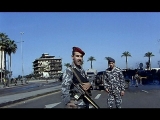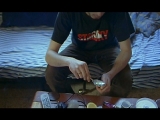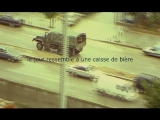Fractured geographies #1
Friday, December 4, 2009 – 8:30 pm
Lida Abdul / Larissa Sansour / Yael Bartana / Gil & Moti /
Internacional Errorista / Waël Noureddine
Maison Pop’ de Montreuil
Free admission
This first program takes note of the interpretations given by contemporary artists from the Middle East (Lebanon, Palestine, Israel) and Afghanistan to the state of “permanent war” that fragments their territories. Based on recent conflicts and occupations, a young generation of artists is rewriting war, demolition and national propaganda, deconstructing and transmuting them in lyrical, poetic, performative and activist ways.
In the presence of Olivier Hadouchi (researcher and film critic)
 In Transit – Lida Abdul (4 min, 2008)
In Transit – Lida Abdul (4 min, 2008)
Lida Abdul was born in Kabul, Afghanistan, in 1973. She emigrated to Germany, India and then the United States, following the Soviet invasion. Her videos use performative poetry to depict Afghan landscapes marked by war and destruction during the fall of the Taliban regime. His work has been shown at the Tate Modern, Frac Lorraine, Frac Aquitaine, etc.
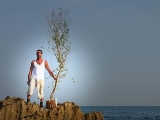 A declaration – Yael Bartana (8 min, 2006)
A declaration – Yael Bartana (8 min, 2006)
Yael Bartana was born in Afula, Israel in 1970. She lives and works in Tel Aviv and Amsterdam. Her work has been shown worldwide (including Documenta 2007, Manifesta 4, Istanbul Biennial, PS1) and was awarded the Prix de Rome in 2005. As a visual artist, video-maker and photographer, she observes and poetically deconstructs national discourses and propaganda in the Middle East.
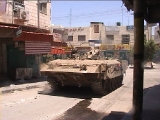 Palestinian Peace Activists vs Israeli Tank – Larissa Sansour (6 min, 2005)
Palestinian Peace Activists vs Israeli Tank – Larissa Sansour (6 min, 2005)
French premiere
Larissa Sansour was born in Jerusalem in 1973. She left Palestine at the start of the first Intifada to continue her studies abroad. Her work is political and mainly based on video and photography. Her work has been exhibited and screened at exhibitions and festivals around the world (Institut du Monde Arabe in Paris, Tate Modern in London, Reina Sofia Museum in Madrid, Rencontres Internationales Paris/Berlin/Madrid, etc.). She lives and works between Bethlehem and Copenhagen.
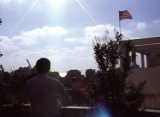 Fiddler on the Roof – Gil & Moti
Fiddler on the Roof – Gil & Moti
(3 min, 2008)
“On a sunny afternoon in Tel Aviv, a violinist expressively plays a hybrid composition, reconstructed from both Israeli and Palestinian hymns.”
Gil Nader was born in Rishon LeZion, Israel in 1968. Moti Porat in Ganey Yehuda, Israel in 1971. They have lived and worked together as a duo since 1994, under the name “Gil & Moti”. Recent solo exhibitions include “Sleeping With the Enemy” in New York, “Love Grows Free” at Galerie Eric Dupont, Paris, “Dating Gil & Moti” at Mucsarnok Kunsthalle, Budapest, and “Available for You” at Kunsthallen Nikolaj, Copenhagen.
Urban Errorist Cartography – Internacional Errorista (Groupe Etcétera) (5 min, 2009) – French premiere
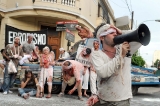 Founded in 2005, Internacional Errorista is an international movement that claims error as a philosophy of life – error as the new ordering principle of today’s reality. Internacional Errorista grew out of a program of actions launched to denounce George W. Bush’s visit and the Summit of the Americas in Mar del Plata, Argentina, in 2005. Originating from the Argentinian collective Etcétera, the Erroristes have focused their reflections on the figure and stereotype of the (t)errorist enemy, in the so-called global war on terrorism. Since then, they have carried out public actions in response to international situations, such as Israel’s occupation of Palestinian territory in Gaza. Urban Errorist Cartography is an action carried out in 2009 in Buenos Aires, the only urban area in the world where Palestine and Israel meet on a map (the street “Palestine” intersects the street “Israel” in the city of Buenos Aires). Their work was exhibited at the Istanbul Biennial 2009.
Founded in 2005, Internacional Errorista is an international movement that claims error as a philosophy of life – error as the new ordering principle of today’s reality. Internacional Errorista grew out of a program of actions launched to denounce George W. Bush’s visit and the Summit of the Americas in Mar del Plata, Argentina, in 2005. Originating from the Argentinian collective Etcétera, the Erroristes have focused their reflections on the figure and stereotype of the (t)errorist enemy, in the so-called global war on terrorism. Since then, they have carried out public actions in response to international situations, such as Israel’s occupation of Palestinian territory in Gaza. Urban Errorist Cartography is an action carried out in 2009 in Buenos Aires, the only urban area in the world where Palestine and Israel meet on a map (the street “Palestine” intersects the street “Israel” in the city of Buenos Aires). Their work was exhibited at the Istanbul Biennial 2009.
Ça sera beau (from Beyrouth with love) – Waël Noureddine (30 min, 2005)
Born in Lebanon in 1978, Waël Noureddine is first and foremost a writer: a professional journalist and poet, his films are what Pasolini called “civil poetry”, a lyrical and critical description of a concrete situation. The artist’s films are dedicated to recording the physical and psychic ravages of conflict in the Middle East: on walls, in the occupation of spaces, in gestures, in the self-destructive behavior of young people. Here, cinema deploys all its means – faithful description, kinetic editing, calligraphic collage, musical mosaic – to polemicize against subjugation and resignation.
Waël Noureddine’s visual poems reflect a heroic conception of the image: “A camera is dangerous, when you make images, you make them ‘for eternity’, it’s a responsibility to make images”.
Ça sera beau (from Beirut with love), an experimental documentary, has been shown at numerous international festivals, and received a special mention from the Jury at the 2006 Clermont-Ferrand Short Film Festival.
Curating & texts : Aliocha Imhoff & Kantuta Quiros / le peuple qui manque
